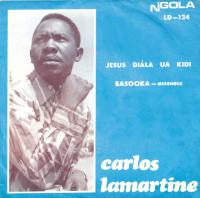 It’s 1943 and Benguela is thriving. As the famous railway heads inland, the town readies itself for a make-over: there is a modern development plan afoot. Progress is the watchword. In one of its streets, an important event is about to occur: Dona Ludovina (a singer of some style, they say), the wife of Sebastião José da Costa, an employee at the Post Office and a former journalist, is about to give birth to a child she will call Carlos Lamartine. Benguela waits, with open arms, to welcome a great son, one who will be a major figure in Angolan music and the author of timeless melodies.
It’s 1943 and Benguela is thriving. As the famous railway heads inland, the town readies itself for a make-over: there is a modern development plan afoot. Progress is the watchword. In one of its streets, an important event is about to occur: Dona Ludovina (a singer of some style, they say), the wife of Sebastião José da Costa, an employee at the Post Office and a former journalist, is about to give birth to a child she will call Carlos Lamartine. Benguela waits, with open arms, to welcome a great son, one who will be a major figure in Angolan music and the author of timeless melodies.
Stages
18.02.2011 | by Mário Rui Silva